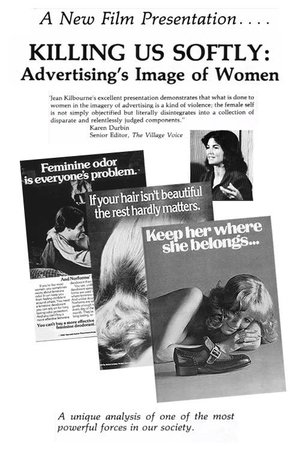Killing Us Softly: Advertising's Image of Women (1979) [N/A]
Featuring:
Jean Kilbourne
Directed by:
Margaret Lazarus, Renner Wunderlich
Release Date:
January 1, 1979
Original Title:
Killing Us Softly: Advertising's Image of Women
Genres:
Documentary
Production Companies:
Cambridge Documentary Films
Cinenova
Production Countries:
United States of America
Ratings / Certifications:
N/A
Runtime: 30
Taking advertisements from magazines, newspapers, album covers and shop front windows, KILLING US SOFTLY presents specific examples of the ways in which advertisements reinforce stereotypes, affect our self-image and how we relate to each other, our concepts of success and worth, love and sexuality, popularity and normality. Using an intriguing mixture of statistics, humor, insight and outrage, Jean Kilbourne questions how far the use and abuse of women in advertising is connected to the sexual exploitation of women at large and the increasing incidence of child abuse.
This is an awesome intro to a broad range of ads. While the film is now a little dated (see Killing Us Softly 3), the fact that much of the analysis still applies after 25 years underscores her point: advertising continually reinforces the idea that women are to be regarded for their appearance - young, thin and white is good, breasts need to be the right shape - and nobody measures up to the standardspresented in advertising. Further, these many ads continually emphasizewomen as objects, as dehumanized - which means that they can be treated asless than fully human."Killing Us Softly" also underscores the point that the ads do this on purpose: advertising is an expensive proposition, and every little moment, every nuance in image and wording is carefully planned and constructed. This encouragessales - "buy something to take care of your shortcomings."Kilbourne connects the consequences of this advertising to American socialissues as diverse as anorexia, violence against women, pornography, theeroticizing of little girls, the infantilizing of adult women, the demeaning of older women, and the special case of the portraying of non-white women as wildanimals (although this last issue gets little attention in this first film in the series). "Sex is more important and less important than what we see in these ads."My (college) students sometimes tell me that they believe she occasionallyoverstates her case on a few of her examples, but I think their quibbles are few and minor (I find that it's males who are more reluctant to accept her evidence, by the way - females generally agree with Kilbourne's analysis).The film is a recording distilled from public lectures before live audiences. Her data draws on ads collected from tv, magazines, newspapers, bus signs,billboards, album covers. The audience appreciates both her abundantexamples, her insights and her humor - and I did, too.






